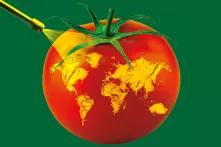New ‘Pesticide Atlas’ by the Heinrich-Böll-Stiftung, Friends of the Earth Europe and PAN Europe reveals toxic global impact of hazardous chemicals used in agriculture.

Brussels, 18 October 2022 – While tension is rising amongst EU Member States on new pesticide reduction targets, the new ‘Pesticide Atlas 2022’ [1] released today by the Heinrich-Böll-Stiftung, Friends of the Earth Europe and PAN Europe shows that the amount of pesticides used worldwide has increased by 80 percent since 1990, causing harm to the health of farmers, consumers and nature alike.
Among other findings, the Pesticide Atlas 2022 exposes that:
- The global pesticide market has almost doubled in the last 20 years. By 2023, the total value of all pesticides used is expected to reach nearly 130.7 billion US dollars. The European Union is one of the world’s biggest markets for pesticides with almost a quarter of all pesticides sold in the EU.
- The EU is also the top exporting region, increasingly selling to countries of the Global South where pesticides actually banned in the EU can be exported. In 2018, European agrochemical companies planned to export 81.000 tonnes of pesticides prohibited on their own fields.
- The growing amount of pesticides used globally leads to a rise in pesticide poisoning worldwide - especially in the Global South, where farmworkers are often not sufficiently protected. According to conservative calculations, there are around 255 million poisoning accidents in Asia, just over 100 million in Africa and around 1.6 million in Europe
- Only a very small number of corporations from the Global North divide the multi-billion dollars market between themselves. The top four firms (Syngenta Group, Bayer, Corteva and BASF) control around 70% of the global pesticide market.
- The use of pesticides is fatal for biodiversity: conventionally managed fields have 5 times lower plant species richness and about 20 times lower pollinator species richness compared to organic fields
- Pesticide active ingredients usually do not stay in the place they were applied. They can seep into the soil and groundwater, become airborne, or blow away – some can be found over 1,000 kilometres away.
- Contrary to corporations’ promises, the cultivation of genetically modified plants has increased the use of pesticides like glyphosate and the growth of resistant weed species.
Dr. Imme Scholz, President of the Heinrich-Böll-Stiftung said:
“In EU countries, legislation has so far failed to lead to a reduction in use of pesticides despite scientific evidence demonstrating the urgent need to do so. The Farm-to-Fork Strategy is a good start to transition away from agricultural systems heavily dependent on agrochemicals, but the EU’s Common Agriculture Policy must be aligned. It is important to recall that delaying environmental policies now will harm global food security that is already threatened by degraded ecosystems and the climate crisis.
Demand coming from the EU, especially to feed livestock, has also contributed to a dramatic increase in pesticide use in biodiversity rich countries like Brazil, Argentina and Paraguay, particularly since the large-scale introduction of genetically modified, pesticide-resistant soy. This exemplifies the need for dietary changes and different biofuel policies.”
Clara Bourgin, Food, Agriculture and Nature Campaigner at Friends of the Earth Europe said:
“The evidence is staggering, the current food system based on the heavy use of poisonous chemicals is gravely failing farmers and consumers and feeding biodiversity collapse.
The EU needs to stop shutting its eyes to the agribusiness’ increasingly toxic trade and listen to its citizens instead. Europe must rethink its food production, gear it towards agroecology and finally set us on the path to pesticide-free farming. Agroecological principles offer us a way out: by restoring ecosystems, building more resilience to pests and contributing to tackling the climate and biodiversity crises.”
Friends of the Earth Europe and the Heinrich-Böll-Stiftung demand more ambitious pesticide reduction targets and more effective support for farmers in their transition towards agroecology. The organisations additionally ask for more data and better indicators to measure pesticide reduction. The current indicator proposed in the new EU Pesticide Regulation is counterproductive [2] and will undermine the implementation of the regulation.
They also call for en end of double standards via a strong new law to end the export of EU-banned pesticides to third countries. Germany and France are already moving ahead and the EU bloc must follow suit.
ENDS
***Join the public launch event on Tuesday, 25 October 2022 at 9:30 in Brussels: ***
For more information, please contact:
Joan Lanfranco, Head of Communications and Outreach at the Heinrich-Böll-Stiftung European Union: Joan.Lanfranco@eu.boell.org
Clara Bourgin, Food, Agriculture and Nature Campaigner at Friends of the Earth Europe: clara.bourgin@foeeurope.org
Gaëlle Cau, Communications Officer at Friends of the Earth Europe: gaelle.cau@foeeurope.org / media@foeeurope.org
***
Notes:
[1] The Pesticide Atlas is a comprehensive overview of facts and figures on global pesticide production and consumption, its impact on people, biodiversity and the climate, and alternative solutions.

